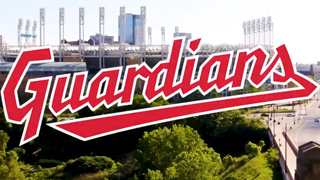 A powerful message of social awareness? Or so much marketing gobbledygook? At best, a bit of both. A powerful message of social awareness? Or so much marketing gobbledygook? At best, a bit of both.
Hanks has been a diehard Indians fan since 1977, when he worked in Cleveland's Great Lakes Shakespeare Festival. He agreed to narrate the video, but it's unclear what creative input he had, if any.
A more honest script would have said: "We were wrong to cling to a name for so long after realizing it was an affront to Native Americans. Though more than a dozen college teams dropped offensive names like Indians over the last five decades, we stubbornly retained it to serve corporate interests. Now, faced with social pressure that could adversely affect our revenue, we're giving the team a new moniker."
Back in 1930 Stanford University adopted the name "Indian" for its sports teams, but by the 1970s students were already demanding change. The school's ombudsperson, Lois Amsterdam, wrote that the Indian mascot was "a reflection of our society's retarded understanding, dulled perception and clouded vision." In 1972 Stanford's trustees voted to banish the name, setting off a series of similar changes at other schools.
Why has it taken so long to jolt professional teams like the Cleveland Indians and the NFL's Washington Redskins (known since last summer as The Washington Football Team)? Eight years ago the Washington owner, Daniel Snyder, told USA Today, "We'll never change the name. It's that simple. NEVER — you can use caps."
But in May, 2020, following the murder of George Floyd in Minneapolis by officer Derek Chauvin, protests mounted over not only police brutality and social injustice but even such matters as names of sports teams. Less than two months after Floyd's death, the Redskins' corporate sponsors were flooded with demands to drop their support of Snyder's team. Nike pulled its gear from the team's website, and FedEx, which holds naming rights for the team's stadium, threatened to remove its signage at a cost to the team of about $45 million. Ten days later, the name Redskins was gone.
When I was a child in New York, I never heard a Yankees fan mention the Highlanders, and I doubt many people in Washington, D.C., wish the Nationals were still the Expos. The truth is, most people – even diehard fans – don't waste a lot of time mourning the loss of team names. The NBA franchise known as the Bullets thought better of the imagery and in 1997 became the Wizards. The baseball team called the Colt .45s in 1962 took just three years to change its name to the Astros. Today, you'd have a hard time finding a fan who cares about either of the gun-themed brands.
But, for brief periods, changes to revered sports franchises do cause a fuss among the narrow-minded. As if to underscore that, former President Donald Trump responded to the announcement in Cleveland by calling it a "disgrace." "A small group of people, with absolutely crazy ideas and policies, is forcing these changes to destroy our culture and heritage," he said in a statement.
The real disgrace, of course, is that professional teams didn't act sooner.
Three pro franchises still have names that might reasonably offend Native Americans: the Chicago Blackhawks in hockey, the Atlanta Braves in baseball and the Kansas City Chiefs in football. All insist their names won't change.
THEY WILL — and you can use caps.
(c) Peter Funt. This column originally appeared in USA Today.
|
|



 A powerful message of social awareness? Or so much marketing gobbledygook? At best, a bit of both.
A powerful message of social awareness? Or so much marketing gobbledygook? At best, a bit of both.